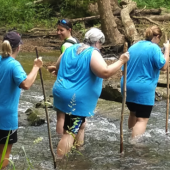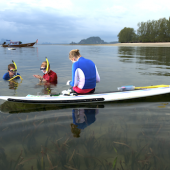Abstract. This study investigates whether children at an urban place-based environmental education camp can develop three dimensions of eco-character development after week-long participation: Head (knowledge), Hand/Feet (action), and Heart (care/connection). Using a community-based and inquiry-driven curriculum, campers practiced the roles of an arborist, ecologist, and environmental steward. Fifty-five Campers were assessed on all three dimensions using a 10-question pre/post-survey. An overall increase in content knowledge, relationships with nature, and motivation for pro-environmental behaviors were found. Outdoor environmental education summer camps and other out of school experiences may be the new avenue for educators and instructors to consider when trying to promote positive eco-character development in future generations.
Continue Reading
Abstract: The purpose of this article is to provide key aspects and learning outcomes associated with the Math of the Mountains Project. Math of the Mountains was a year long grant project that engaged 60 K12 mathematics teachers in the key concepts and applications of place-based learning and mathematics instruction. Through online coursework and peer support, a four-day immersive field experience, and teacher led field experiences, participants applied elements of PBL to create lesson activities that support real-world learning and problem solving scenarios.
Continue ReadingReynolds (2004) says we write from where we are (p. 53). What does that mean? In a class called Composing our City, place, place-based learning, and place-based projects were the sustainable modus operandi. We wrote, thought, and created where we are from. As we engaged in place-based learning, we touched on topics like the emotions places evoke, how environments come with a sense of place, learning the art of flaneurism, and how crossing borders in our assignments teaches us aspects about our environments and ourselves we could not learn otherwise. Flaneurism was our method of collecting data and the object of our writing, as we explored, described, and discovered where we are from.
Continue ReadingThis paper examines the conceptualization and implementation of teaching inequality through placed-based and experiential learning while focusing on issues that impact the sustainability of communities through the effects of the social and historical constructs of race, class, and gender. The goal is to push students to rethink issues of sustainability in a more holistic way including social, economic, and political aspects to sustainability. In turn, students are empowered through a Freirian pedagogy to become “student-teachers” for the society in which they live in partnership with a local community organization to create public interactive history exhibits that create educational opportunities to both identify and document historical and current inequalities and their effects on the present moment and to encourage the community to engage with and analyze their own history in a manner to create meaningful dialogue and public discussion for the creation of a more equitable and sustainable society.
Continue Reading
Women farmers in the U.S. are more likely than men to adopt more ecologically-based practices on their farms. In order for such practices to increase, it is relevant to understand how these women farmers learn the values and skills that shape their work. Place attachment (including the emotional connection to a locale and the intangible, felt meanings, values, and symbols) and place meaning (including personal values, socially and iteratively constructed values) seem to be important drivers of active care for place. These are mediated by ecological and social knowledge, experience, social relationships, and identity. If these factors are supportive rather than in tension with place attachment and place meaning, an active care for place can further develop the context for emotional bonds and the story of the locale. Regenerative farmers as well as others who work directly with the land are perhaps uniquely positioned to be leaders in the process of becoming part of a place. In this paper I summarize the literature about farmers’ relationship to place using a framework developed from the general sense of place literature. Finally, I discuss two aspects of this framework that emerged from research with 14 women farmers in Wisconsin and Minnesota: a georgic ethic and an ecocentric perspective: functional components of an ecology of love.
Continue ReadingThis conceptual article presents the Head, Heart and Hands Model for Transformational Learning. The model was conceptualized from a synthesis of diverse literature, such as sustainable education, transformative learning theories, placed-based learning, indigenous learning approaches, experiential learning, eco-literacy, curriculum theory and conceptual change in science classes. Transformative processes are necessary to change the prevalent anthropocentric eco-paradigm of western culture toward more sustainable values and behaviors. Head, hand and heart is a holistic approach to developing ecoliteracy introduced by Orr (1992) and expanded by Sipos, Battisti and Grimm (2008). The model shows the holistic nature of transformative experience and relates the cognitive domain (head) to critical reflection, the affective domain (heart) to relational knowing and the psychomotor domain (hands) to engagement. Pugh’s (2002) pragmatic construct of transformational learning experience offers an analytic tool for measuring transformational experiences through expanded perception (cognitive), expanded value (affective) and active use of learned concepts (psycho-motor). This model not only represents the multi-dimensional nature of transformative processes, it also includes the importance of learning context. The context of place provides a framework of authentic experience for deeper reflection, sense of belonging and body/sensory stimulation that acts as a catalyst for deep engagement required for transformation. Literature in the domain areas are discussed as well as the importance of nature connection and love of place to sustainability values and pro-environmental behaviors.
Continue Reading
Jack Turner (2005) once wrote “we treat the natural world according to our experience of it.” How are our students “experiencing sustainability” in U.S. colleges and universities? With the rise in popularity of education for sustainability initiatives in both K-12 and higher education, experiential education has been championed as a key pedagogical approach moving forward. Experiential curriculum projects come in many different forms. From outdoor education and service learning to so-called “hands-on” applied work on campus projects and field science research, students are increasingly “learning by doing.” Yet far from just another methodology to be used in the classroom, the rise of experiential approaches indicates deeper tectonic shifts in higher education. As students and faculty engage in this form of learning, questions are raised as to the historic divide between theory and practice, the separation between so-called “town” and “gown” cultures, the curriculum and the co-curriculum, and what forms of knowledge and skills are of the most worth to a 21st century graduate. This analysis first briefly surveys the theoretical history of experiential education before proceeding to consider two specific curriculum projects at the intersections between sustainability and experiential education—place-based learning and project-based learning. The analysis concludes with a discussion of the possibilities and limitations of current forms of experiential education in higher education and a consideration of future trends and developments.
Continue Reading
Understanding how we live (culture) and its impact on where we live (ecology) is one of the key issues facing sustainability and sustainability education. The International Sustainable Development Studies has developed a study abroad program for American college and university students in Thailand, “People, Ecology and Development” to address these issues through experiential studies of sustainability. Courses each semester focus on understanding the broader challenges of sustainable development through experiential studies of specific landscapes and cultures in the villages, mountains, coasts and islands throughout Thailand. This paper examines the key components of ISDSI’s programs, and provides a framework for understanding how these principles can be used to teach about sustainability within the broader context of issues of social justice and global learning more generally. Key components of the ISDSI approach include: community based learning — working with local communities to design courses that reflect community needs, knowledge and struggles; place-based learning — examining both the culture and ecology of specific locations, watersheds, bioregions, island archipelagos, etc.; experiential learning — learning through direct examination of and participation in the cultural practices (lifeways, norms, etc.) and study of ecological components (forests, coral reefs, etc.); and expedition based — learning during focused expeditions through the landscapes being studied, usually human powered (backpacking through remote mountain forests, sea kayaking between islands, etc.).
Continue Reading